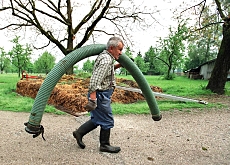
Rise in retirement age inevitable say experts

A key government advisory committee on economic questions has warned that a rise in the retirement age is inevitable in the long-term.
In a report released on Thursday, it said that the falling birth rate and increased life expectancy meant that the “dogma” of pensions at age 65 would have to be abandoned.
Committee president Gebhard Kirchgässner, a professor at St Gallen University, said that population changes were “dramatic”.
The low birth rate and rising life expectancy meant that there was a growing discrepancy between the numbers of workers and pensioners, he explained.
In 2000 for every ten people in employment between the ages of 20 and 64, there were 3.4 pensioners. By 2030 the ratio is expected to be 10:5.5 or 10:6.
A solution, said the committee, is to increase the retirement age in the long-term and to allow more older people to work part-time.
Early retirement would still be allowed in certain professions, including those with high levels physical exertion, such as construction.
But extra measures are still needed to shore up the pension system, said the experts. These funds could come from increasing the Value Added Tax rate or from creating a national inheritance tax.
They added that pensions funds also needed a financial overhaul to ensure that they were in good health for the future.
Women
The committee, which is made up of economics professors, parliamentarians and business figures, also recommended more measures to help women combine careers and families.
These included improving the childcare offer and coordinating school hours – which currently vary depending on the age of the child – to allow both parents to work at least part-time.
The aim is to encourage more women into the workplace while increasing the birth rate, said the committee. At present, 40 per cent of women with a higher education have no children. Overall the birth rate stands at 1.4 per woman in Switzerland.
However, the committee ruled out encouraging more migrant workers to the country, mainly for political reasons.
Controversial
Moves to increase the retirement age have so far been controversial. Swiss Interior Minister Pascal Couchepin has in the past proposed delaying the retirement age to 67, but the suggestion was not welcomed by unions.
Switzerland’s association of small and medium-sized enterprises has also argued for later retirement, at 67.
The Swiss Employers’ Association has called for the retirement age to be raised to 66 by 2013, to cover pension costs and spur economic growth.
swissinfo with agencies
Old-age and survivors’ insurance is the cornerstone of the Swiss social insurance system. It is two-fold.
Old-age pensions should enable their beneficiaries to retire with financial autonomy.
Survivors’ pensions aim to ensure that families already burdened by the death of a close family member are spared financial hardship.
According to the advisory committee’s annual report, the retirement age, currently 65 years, should be increased in the long-term.
The population is changing with more pensioners in relation to the number of people in employment – meaning an overburdened pensions system.

In compliance with the JTI standards
More: SWI swissinfo.ch certified by the Journalism Trust Initiative

























You can find an overview of ongoing debates with our journalists here . Please join us!
If you want to start a conversation about a topic raised in this article or want to report factual errors, email us at english@swissinfo.ch.